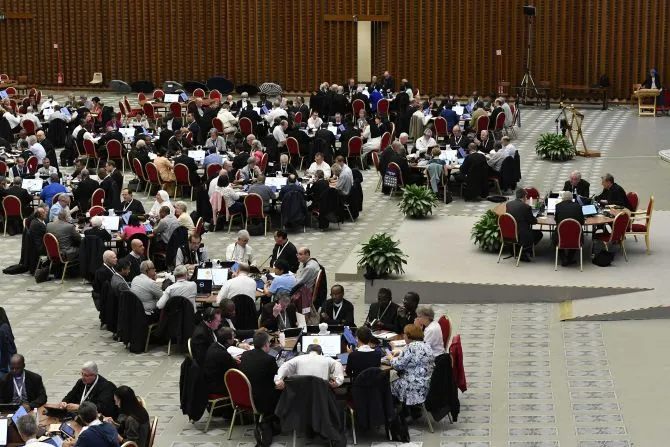This process also involves moments of silence for personal prayer and reflection on what was heard.
Advantages to listening
“One of the distinguishing characteristics of the method [of communal discernment] is the emphasis it puts on listening,” Lusvardi explained.
Since everyone gets a chance to speak and be heard — something that can be unusual in a very noisy world — the effect can “almost be therapeutic,” the priest said.
“Since people are sharing the fruit of their prayer, conversation often is more patient, open, and respectful,” he added. “You get to know the other people and their lives of faith in a deeper way than you would at most meetings. The emphasis is on understanding before evaluating.”
(Story continues below)
He said the method can be very helpful for setting a good tone among participants in a meeting. And in a parish or diocesan setting, dedicating time to praying about an issue before sharing the fruits of that prayer — “before plunging into the gritty details” — could also be helpful, he said.
Limits of the method
The Jesuit explained that he also sees some disadvantages to the method. While it is great for helping people understand one another better, “it is not well-suited for careful or complex theological or practical reasoning.”
“Doing that requires thinking that is critical, that weighs the pros and cons of what people say. It also requires a degree of objectivity that this method is not well-suited to provide,” he said. “Sound theology needs to always ask the question, ‘That may sound good, but is it true?’”
The method of communal discernment emphasizes mutual understanding, so it may be harder to pose the question about whether what someone says is true, Lusvardi argued.
“Sometimes people have harmful ideas; while it can be helpful to hear them out, at some point it is irresponsible and uncharitable not to correct the harm. I’ve found the process isn’t always well-suited to that in practice.”
And the method cannot be substituted for empirical evidence, revelation, or Church teaching, he added, recalling that St. Ignatius was “very clear that not all things are the proper object of discernment.”
“If something is a sin, you do not discern whether to do it or not,” Lusvardi explained. “If you have made a commitment, you do not discern whether to be faithful to it or not. You only discern between things that are good.”
“If whatever occurs to you in prayer contradicts what has been revealed by Jesus Christ, then it is not the work of the Holy Spirit,” he said.
The Jesuit explained that Ignatius also knew the evil spirit can masquerade as an angel of light and that the saint’s rules for discernment of spirits “are meant to help us avoid being fooled.”
He cautioned that “because the method produces a positive experience of faith sharing, it can sometimes lead to naive decision-making. Just because something occurs to us in prayer does not mean that it is the will of God. It needs to be tested by objective truth and reasoning, and sometimes we need to be self-critical.”
St. Ignatius, the priest said, also “did not foresee communal discernment as a characteristic of the governance of the Jesuit order, which is hierarchically structured.”
“So this method can be used as a way of helping a superior understand the men that he is leading and to bring out some of the feelings and concerns that surround the issues under discussion, but it is still the superior who makes the decision,” he said.
Hannah Brockhaus is Catholic News Agency's senior Rome correspondent. She grew up in Omaha, Nebraska, and has a degree in English from Truman State University in Missouri.








